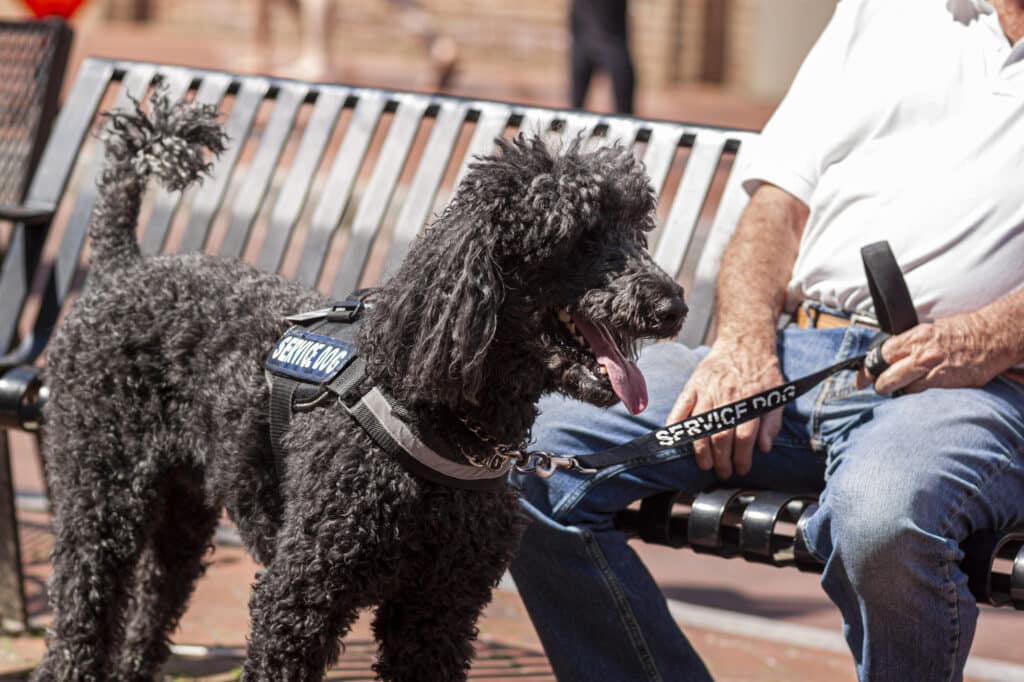
Post-traumatic stress disorder (PTSD) is a debilitating mental health condition that can severely affect a person’s quality of life. Those with PTSD often experience intrusive thoughts, flashbacks, nightmares, hyperarousal, and avoidance behaviors. However, service dogs have gained significant attention for their potential to alleviate these symptoms and provide support for individuals with PTSD. In this article, we will explore the various ways in which service dogs can be effective for individuals suffering from PTSD.
Service Dogs Can Be Indispensable in Helping People with PTSD
Service dogs are specifically trained to perform tasks that help mitigate the effects of a disability. For individuals with PTSD, service dogs can provide invaluable assistance by detecting and interrupting anxiety or panic attacks, creating physical barriers to provide a sense of security, and providing emotional support.
One of the primary ways service dogs assist people with PTSD is through their ability to recognize and respond to anxiety or panic attacks. These dogs are trained to detect biochemical changes in their handler’s body, such as changes in breathing patterns, heart rate, or perspiration. Once they identify these changes, they are taught to perform specific tasks to help their handler regain control. For example, they may nudge or paw at their handler, apply deep pressure therapy, or provide distractions by retrieving objects. This immediate intervention can help prevent the escalation of anxiety or panic attacks, allowing the individual to regain a sense of calm and focus.
Beyond detecting and interrupting panic attacks, service dogs can also create physical barriers to enhance a sense of security. PTSD often leads to hyper-vigilance and constant scanning of the environment for potential threats. By actively scanning the surroundings, service dogs provide their handlers with a sense of safety, allowing them to relax and regain control over their thoughts and emotions. Additionally, service dogs can provide a physical barrier or create distance between their handler and potentially triggering situations or individuals, helping to alleviate feelings of anxiety and unease.
Emotional support is another vital aspect of a service dog’s role in managing PTSD symptoms. These dogs are specially trained to provide comfort and emotional grounding during moments of distress or emotional overload. Individuals with PTSD often feel isolated and estranged from others, and the presence of a service dog can alleviate these feelings and offer a constant source of support. Just having a dog nearby can provide a feeling of companionship and reduce feelings of loneliness, which consequently strengthens their overall emotional well-being.
Moreover, service dogs encourage their handlers to develop routines and engage in regular physical exercise. The responsibility of caring for a service dog necessitates daily walking, feeding, and grooming, which helps individuals establish structure and regain a sense of purpose. Engaging in regular exercise, whether through play or walking, also releases endorphins that promote mental and physical well-being, thereby reducing the severity of PTSD symptoms.
Service dogs provide more than just practical assistance to individuals with PTSD; they also offer unconditional love and non-judgmental support. These dogs are trained to be attuned to their handler’s emotional state and respond accordingly. They can sense when their handler is feeling overwhelmed or anxious and provide comfort and reassurance. This emotional connection can have a profound healing effect on individuals with PTSD, often reducing feelings of fear, shame, and vulnerability.
In addition to these potential benefits, service dogs also help individuals with PTSD by increasing their engagement with the outside world. Due to the debilitating nature of the condition, people with PTSD often become isolated and find it challenging to participate in social activities or leave their homes. The presence of a service dog can act as a bridge, enabling individuals to reconnect with the community and engage in various public settings. Moreover, the public perception of a service dog often elicits a more positive and understanding response from others, which can further contribute to the individual’s sense of belonging and inclusion.
Although service dogs can be highly beneficial for individuals with PTSD, it is essential to understand that they are not a one-size-fits-all solution. Each person’s experience with PTSD is unique, and the effectiveness of a service dog may vary depending on individual circumstances. It is crucial to work closely with a mental health professional to assess whether a service dog is a suitable option and to undergo the necessary training to ensure a successful partnership.
In conclusion, service dogs have proven to be highly effective in supporting individuals with PTSD. Their ability to detect and interrupt anxiety or panic attacks, create physical barriers, and provide emotional support helps individuals regain control over their lives and manage their symptoms more effectively. Moreover, these dogs promote engagement with the outside world and facilitate the development of daily routines and exercise, which are vital for overall well-being. If you or someone you know suffers from PTSD, it may be worth considering the potential benefits of a service dog as part of a comprehensive treatment plan.



